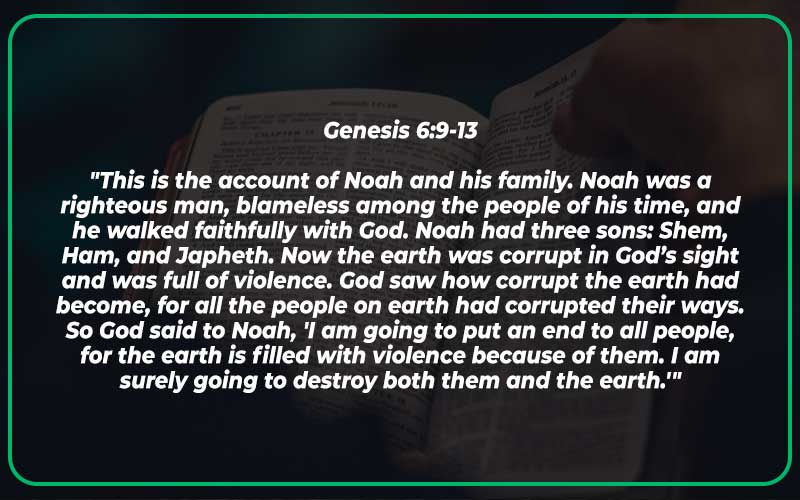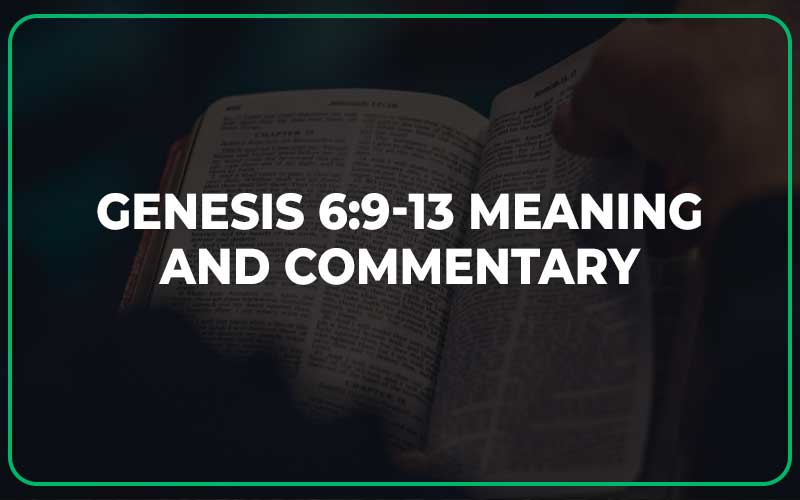Genesis 6:9-13
“This is the account of Noah and his family. Noah was a righteous man, blameless among the people of his time, and he walked faithfully with God. Noah had three sons: Shem, Ham, and Japheth. Now the earth was corrupt in God’s sight and was full of violence. God saw how corrupt the earth had become, for all the people on earth had corrupted their ways. So God said to Noah, ‘I am going to put an end to all people, for the earth is filled with violence because of them. I am surely going to destroy both them and the earth.'”
Genesis 6:9-13 Meaning
The Bible verses in Genesis 6:9-13 paint a picture of a world that had become corrupt and filled with wickedness. However, amidst this darkness, there is Noah. The verses highlight Noah’s righteousness and his obedience to God’s commands. These verses reveal that even in the midst of a fallen and sinful world, there is hope for those who choose to follow God’s ways.
Explanation and Commentary on Genesis 6:9-13
In Genesis 6:9, we are introduced to Noah, who is described as a righteous man, blameless among the people of his time. This does not mean that Noah was sinless, but rather that he was faithful and upright in his walk with God. Noah’s righteousness stood out in stark contrast to the wickedness that had overcome the earth. It is a reminder that no matter the state of the world around us, we have the choice to live a life that is pleasing to God.
Noah’s characterization as “righteous” and “blameless” signifies his adherence to God’s commands and his moral uprightness in a world steeped in moral decay. This depiction of Noah emphasizes the significance of personal righteousness and faithfulness in the eyes of God, illustrating how one individual’s obedience amidst prevailing wickedness can make a profound difference.
The text further emphasizes the extent of corruption prevalent in society during Noah’s time. It speaks of the pervasiveness of violence and evil thoughts in people’s hearts. This portrayal highlights the consequence of unchecked sin and the erosion of moral values within a community.
The comparison drawn between Noah, who found favor in God’s eyes, and the rest of humanity underscores the importance of faith and righteousness in fostering a relationship with the divine. It serves as a reminder of God’s response to human disobedience and His eventual judgment upon the unrepentant.
This passage aligns with other biblical teachings that emphasize the importance of righteous living and obedience to God’s commands. Throughout the Bible, individuals such as Noah, Abraham, and others are commended for their faithfulness and obedience amidst challenging circumstances, serving as models for us to emulate.
The narrative of Noah and the impending flood serves as a cautionary tale about the consequences of persistent wickedness and the importance of remaining steadfast in faith even in the face of societal corruption. It prompts us to reflect on our own lives and consider the significance of our choices in a world that often veers away from God’s intentions.
Genesis 6:9-13 challenges us to prioritize righteousness, faithfulness, and obedience to God’s will, even when surrounded by a culture that may oppose these values. It encourages us to stand firm in our convictions and seek to live in alignment with God’s principles, knowing that our choices have significance both in our relationship with God and in the wider world around us.
Context of Genesis 6:9-13
Genesis 6:9-13 is part of the larger narrative of the Book of Genesis, which details the early history of humanity, focusing specifically on the period before the great flood. This passage occurs within the account of Noah, a righteous man whom God chose to save from the impending flood judgment.
Before these verses, Genesis 6 describes a world spiraling into moral decay. Human wickedness had become widespread, leading to God’s sorrow and regret over creating humanity. The text highlights the prevalence of violence and corruption in society, illustrating the depths of human depravity.
Amidst this backdrop, Genesis 6:9-13 introduces Noah as a righteous and blameless man who found favor in the eyes of God. It contrasts Noah’s character with the overall wickedness of his contemporaries, emphasizing his obedience to God in an increasingly disobedient world.
God chose Noah to build an ark to save himself, his family, and pairs of every living creature from the impending flood that would cleanse the earth of its corruption. This passage sets the stage for the story of the flood, illustrating God’s judgment on humanity’s sin while also showcasing His grace and mercy in providing a means of salvation for the faithful through Noah and the ark.
Genesis 6:9-13 serves as a crucial turning point in the biblical narrative, marking the beginning of the account of the flood and demonstrating the themes of God’s justice, judgment, and the importance of righteousness amidst a corrupt world.

Breaking Down the Key Parts of Genesis 6:9-13
“These are the generations of Noah” (Genesis 6:9): This phrase indicates a shift in focus from the general state of humanity to the specific individual, Noah. It sets Noah apart as a chosen vessel in God’s plan for the redemption of humanity.
“Noah was a righteous man, blameless in his generation” (Genesis 6:9): This highlights Noah’s character and relationship with God. He was upright and faithful, even amidst a corrupt generation.
“Noah walked with God” (Genesis 6:9): This phrase speaks of Noah’s intimate relationship with God. It signifies his obedience, trust, and communion with God.
“The earth was corrupt in God’s sight, and the earth was filled with violence” (Genesis 6:11): This verse emphasizes the pervasive nature of sin and wickedness during that time. It portrays a society that had turned away from righteousness and embraced violence.
“And God saw the earth, and behold, it was corrupt, for all flesh had corrupted their way on the earth” (Genesis 6:12): This verse reinforces the depth and extent of the sin that had infected all of humanity.
“And God said to Noah” (Genesis 6:13): This signifies God’s distinct interaction with Noah and His selection of Noah to be a part of His plan for the salvation of humanity.
Bible Study on Genesis 6:9-13
These verses provide us with valuable lessons and insights into our own walk with God. Despite the prevailing wickedness and corruption in the world, Noah served as an example of righteousness and obedience. It teaches us that we can choose to live differently and seek God’s favor even amidst a fallen world.
Noah’s righteousness did not exempt him from experiencing the effects of the flood, but it did position him to receive God’s grace and protection. It illustrates that God sees and honors faithfulness, even when it is countercultural.
These verses also remind us of the consequences of sin. The wickedness and violence in Noah’s generation provoked God’s judgment. It serves as a warning that unrepentant sin leads to destruction. However, God’s judgment is not without mercy. He provided a means of deliverance for Noah and his family through the ark.
Also Read: Genesis 5:25-32 Meaning and Commentary
Biblical Translations of Genesis 6:9-13
Genesis 6:9-13 King James Version (KJV)
“These are the generations of Noah: Noah was a just man and perfect in his generations, and Noah walked with God. And Noah begat three sons, Shem, Ham, and Japheth. The earth also was corrupt before God, and the earth was filled with violence. And God looked upon the earth, and, behold, it was corrupt; for all flesh had corrupted his way upon the earth. And God said unto Noah, ‘The end of all flesh is come before me; for the earth is filled with violence through them; and, behold, I will destroy them with the earth.'”
Genesis 6:9-13 English Standard Version (ESV)
“These are the generations of Noah. Noah was a righteous man, blameless in his generation. Noah walked with God. And Noah had three sons, Shem, Ham, and Japheth. Now the earth was corrupt in God’s sight, and the earth was filled with violence. And God saw the earth, and behold, it was corrupt, for all flesh had corrupted their way on the earth. And God said to Noah, ‘I have determined to make an end of all flesh, for the earth is filled with violence through them. Behold, I will destroy them with the earth.'”
Genesis 6:9-13 New American Standard Bible (NASB)
“These are the records of the generations of Noah. Noah was a righteous man, blameless in his time; Noah walked with God. Noah fathered three sons: Shem, Ham, and Japheth. Now the earth was corrupt in the sight of God, and the earth was filled with violence. God looked on the earth, and behold, it was corrupt; for all mankind had corrupted their way upon the earth. Then God said to Noah, ‘The end of all flesh has come before Me; for the earth is filled with violence because of them; and behold, I am going to destroy them with the earth.'”
Genesis 6:9-13 New King James Version (NKJV)
“This is the genealogy of Noah. Noah was a just man, perfect in his generations. Noah walked with God. And Noah begot three sons: Shem, Ham, and Japheth. The earth also was corrupt before God, and the earth was filled with violence. So God looked upon the earth, and indeed it was corrupt; for all flesh had corrupted their way on the earth. And God said to Noah, ‘The end of all flesh has come before Me, for the earth is filled with violence through them; and behold, I will destroy them with the earth.'”
Genesis 6:9-13 New Living Translation (NLT)
“This is the account of Noah and his family. Noah was a righteous man, the only blameless person living on earth at the time, and he walked in close fellowship with God. Noah was the father of three sons: Shem, Ham, and Japheth. Now God saw that the earth had become corrupt and was filled with violence. God observed all this corruption in the world, for everyone on earth was corrupt. So God said to Noah, ‘I have decided to destroy all living creatures, for they have filled the earth with violence. Yes, I will wipe them all out.'”
Genesis 6:9-13 Christian Standard Bible (CSB)
“These are the family records of Noah. Noah was a righteous man, blameless among his contemporaries; Noah walked with God. And Noah fathered three sons: Shem, Ham, and Japheth. Now the earth was corrupt in God’s sight, and the earth was filled with wickedness. God saw how corrupt the earth was, for every creature had corrupted its way on the earth. Then God said to Noah, ‘I have decided to put an end to every creature, for the earth is filled with wickedness because of them; therefore I am going to destroy them along with the earth.'”
Final Thoughts
Genesis 6:9-13 provides a powerful message of hope, even in the midst of a fallen world. It reminds us that our choices matter and that we can choose righteousness, obedience, and walking with God, regardless of the prevailing culture. It also serves as a warning against the consequences of unchecked sin.
Like Noah, we are called to stand out as lights in a dark world, shining the love and truth of Christ. In doing so, we may experience opposition and hostility, but God promises to be our refuge and deliverer. Let us strive to walk with God, even when it seems unpopular or challenging, knowing that He sees and rewards our faithfulness.

